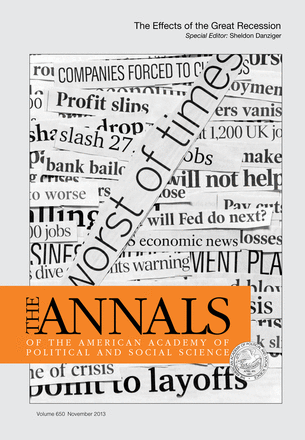In this volume, AAPSS Fellow Sheldon Danziger and other leading experts from economics, political science, sociology, and psychology focus on how federal and state government policy responses affected the course of the Great Recession and on the many ways in which the recession has affected (or likely will affect) the lives of American workers, families, and children.
The Great Recession, which officially lasted from December 2007 through June 2009 (as dated by the National Bureau of Economic Research), was the most severe recession since the Great Depression of the 1930s. Both gross domestic product (GDP) and the number of jobs declined by about 6 percent and median family income by about 8 percent. It lasted longer than any recent recession and was precipitated by a collapse in housing values and stock prices that negatively affected the economic well-being and security of most U.S. families. The economy has yet to fully recover from the Great Recession.

